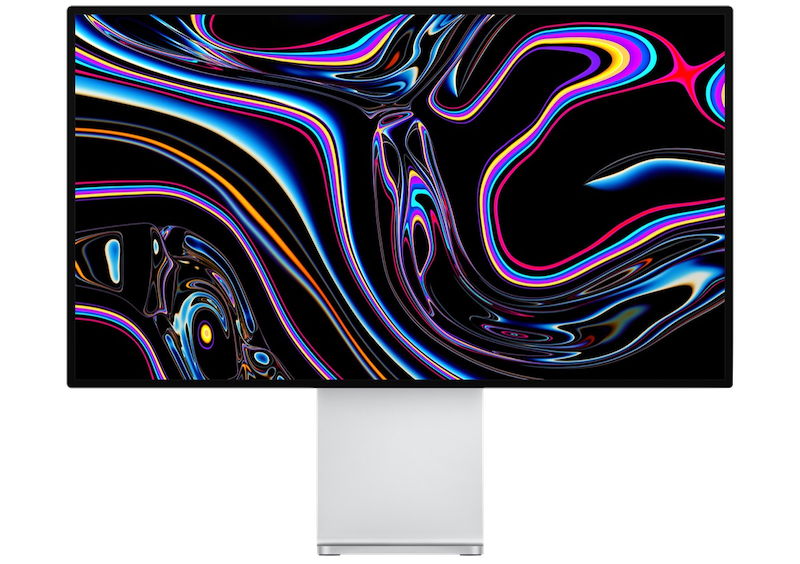
Should You Buy the Pro Display XDR?
The 2019 Pro Display XDR is Apple's high-end standalone display, offering a high-resolution 6K display that can compete with reference monitors. The Pro Display XDR is the oldest external display in Apple's lineup, and it could be nearing the end of its product cycle. Since it is part of a product line with no previous models, we have no clear indications of how long Apple could wait to update it. The display is now six years old, but no new model is on the horizon, so most buyers may not want to wait for a replacement machine to launch.
The Pro Display XDR is less of a priority for Apple because it is an expensive, niche product, and there is no word as of yet on when we might see a refreshed version.
For those who find the Pro Display XDR to be too expensive, there is the Studio Display, Apple's most affordable external display, which starts at $1,599 and comes with a stand, which may be more appropriate for some customers.
Pro Display XDR
Contents
Apple stopped making Apple-branded displays after the Apple Thunderbolt Display, which was discontinued in 2016, but in 2019, Apple got back into the display market starting with the Apple Pro Display XDR, a companion display for the high-end high-throughput modular Mac Pro.
According to Apple, the Apple Pro Display XDR is the world's best pro display. It's priced starting at $4,999, which is expensive, but Apple created it to compete with professional reference displays rather than displays designed for home use purposes. Reference displays are designed to offer superior brightness, color accuracy, and contrast ratio for color grading and evaluation purposes when editing photos and videos.
The Pro Display XDR is a 32-inch 6K Retina display with a 6016 x 3384 resolution, which offers more than 20 million pixels for what Apple says is a super-sharp, high-resolution viewing experience with 40 percent more screen real estate than a Retina 5K display.
Design wise, the Pro Display XDR matches the Mac Pro with the same aluminum enclosure with a lattice pattern that serves as an advanced thermal system. The display uses edge-to-edge glass with a narrow 9mm border, and it is sold alongside a Pro Stand with an "intricately engineered arm" designed to counterbalance the display.
The Pro Stand, which costs $999 on top of the $4,999 price of the display, offers tilt and height adjustment and allows for use in both landscape and portrait modes. There's also an optional VESA mount adapter that's interchangeable with the stand and can be purchased separately.
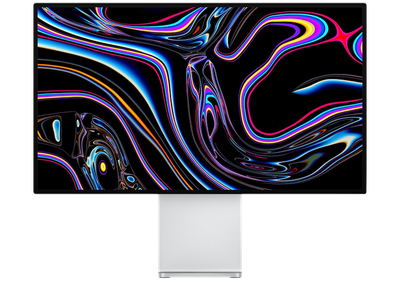
The Pro Display XDR features 10-bit and P3 wide color support for reproducing true-to-life colors, plus it offers 1,600 nits of peak brightness and a sustained 1,000 nits of brightness. A superwide viewing angle and a 1,000,000:1 contrast ratio.
To cut down on glare and reflected light, Apple designed the Pro Display XDR with "industry leading anti-reflective coating" with a new matte option called "nano-texture" available as a $1,000 upgrade. The nano-texture feature uses glass etched at the nanometer level to cut down on reflectivity and glare, and it is a uniquely Apple invention.
With its high brightness, the Pro Display XDR includes HDR that's designed to reflect what the eye sees in the real world, which Apple says is a "whole new extreme."
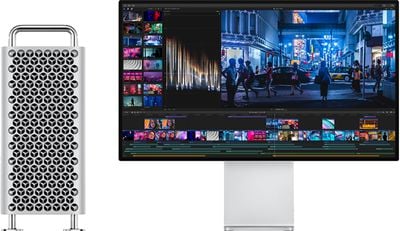
The Pro Display XDR connects to a machine using a single Thunderbolt 3 cable, and the new Mac Pro can support up to six of the XDR displays.
Apple initially released the Pro Display XDR in 2019 alongside the Mac Pro, and it can be purchased from the online Apple Store. Apple in March 2022 released a more affordable alternative, the Studio Display, which features a 27-inch 5K display, an A13 chip, and a built-in camera and six speaker sound system.
Issues
In February 2022, Apple released a support document explaining that a warning symbol can show up on the Pro XDR Display when it is running too hot, leading to brightness being temporarily diminished. This situation can occur if the ambient temperature of the room is high and if bright content has been playing for an extended period of time. Apple offers several solutions for those who see the warning, including lowering the temperature of the room and temporarily putting the device to sleep to allow it to cool.
Design
The Pro Display XDR is Apple's largest display to date, measuring in at 32 inches diagonally. It has super slim 9mm bezels around the edge-to-edge display, and at the back, it features the same latticed aluminum design as the Mac Pro.
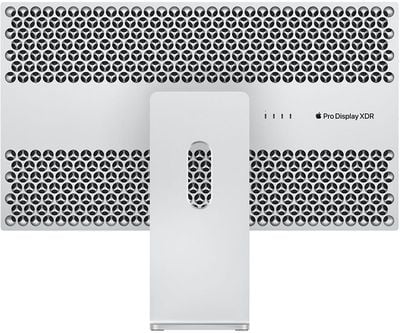
Apple says the lattice pattern cuts down on weight, increases airflow, and serves as a heat sink, which helps the Pro Display XDR maintain its brightness indefinitely.
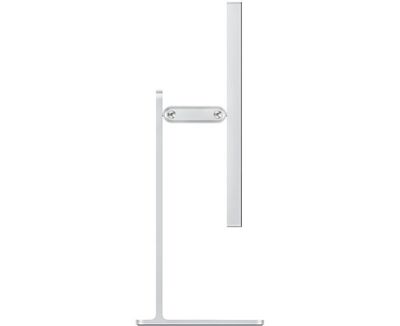
The lattice design more than doubles the the surface area exposed to air, and inlet and exhaust vents draw in cool air and eject hot air away from the system.
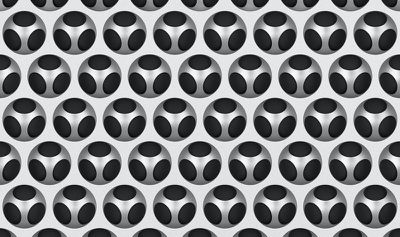
The aluminum enclosure of the Pro Display XDR is just an inch thick, so while it's a large display, it's lightweight for its size to maximize portability. The Pro Display XDR measures in at 28.3 inches wide, 16.2 inches tall, and it weighs 16.49 pounds.
Stand
Apple designed a Pro Stand to go with the Pro Display XDR, and the stand is sold separately for an additional $999. It provides –5° to +25° tilt and 120mm of height adjustment, as well as allowing the Pro Display XDR to rotate into portrait mode and back to landscape mode.

The Pro Stand attaches and detaches easily using magnets so that the display can be taken on location, and there's also an optional VESA mount adapter sold separately for $199. At its tallest position in landscape mode, the Pro Display XDR is 25.7 inches tall with the stand. It's 21 inches tall at the lowest position, and maxes out at 31.7 inches in portrait mode.
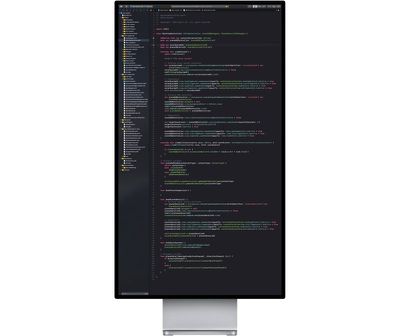
Display Quality
Apple's Pro Display XDR is a 6K display with a 6016 x 3384 resolution and more than 20 million pixels. P3 wide color gamut and true 10-bit color with over 1 billion colors offers professionals a more true-to-life viewing experience for photo and video editing.
At a 6K resolution and 218 pixels per inch, the display offers 40 percent more screen real estate than a Retina 5K display.

Apple says the Pro Display XDR features the industry's best polarizer technology for a superwide color-accurate off-axis viewing angle, which lets multiple people view more accurate content at the same time.
The Pro Display XDR was engineered to offer up to 25x better off-axis contrast than a typical LCD.

An anti-reflective coating keeps reflected light from impacting the display, and there's an optional $1,000 matte upgrade that uses a nano-texture technology. Nano-texture is glass etched at the nanometer level to cut down on reflectivity and glare, unlike a standard matte display that uses a coating designed to scatter light.
The nano-texturing process offers a matte look able to maintain contrast while scattering light to reduce glare as much as possible. Those who elect to get the nano-texture finish need to make sure to clean the display only with the provided polishing cloth, as standard cleaning cloths could damage it.
True Tone is supported on the Pro Display XDR. The feature takes advantage of what Apple calls a breakthrough dual ambient light sensor design (with one sensor at the back and one at the front) to adjust the display to the ambient lighting in the environment.
Apple says the more advanced True Tone functionality facilitates more advanced adjustments to color and the intensity of the display for accurate viewing in all lighting conditions.
HDR
According to Apple, the Pro Display XDR takes high dynamic range "to a whole new extreme," which is actually how the display got its name. The XDR stands for "Extreme Dynamic Range" because it takes brightness, contrast, and color to a "whole new level."
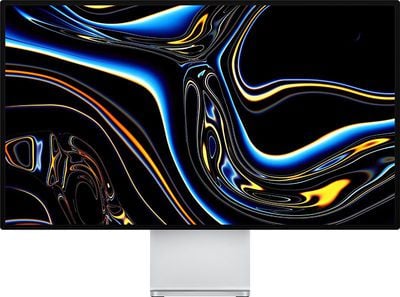
There's a backlighting system that produces 1,000 nits of continual full-screen brightness and 1,600 nits of peak brightness, which surpasses a standard display. A typical desktop display, for example, has a sustained brightness of 350 nits.
It has a 1,000,000:1 contrast ratio for bright highlights and super dark blacks. According to Apple, the Pro Display XDR cuts down on unintended glow called blooming with advanced LED technology, light shaping, and intelligent image processing.
Ports and Connectivity
The Pro Display XDR connects to a Mac, including the Mac Pro, over a single Thunderbolt 3 cable. The Mac Pro supports up to six of the Pro Display XDR displays. There's one Thunderbolt 3 port that offers up to 96W of power and three USB-C ports for charging or syncing.
Workflow
Apple says the Pro Display XDR can be easily adjusted to match the requirements of HDR, HD, SD video, digital cinema, and broader uses like photography, web development, web design, and print.
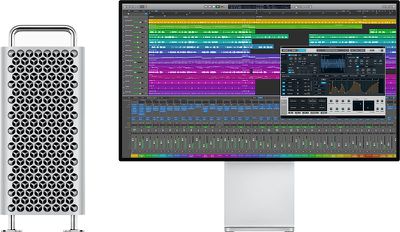
Select a mode, and the display is designed to reconfigure to match a specific color space, white point, gamma, or brightness.
The Pro Display XDR supports customized reference modes, allowing users to create setups for their workflows with custom options for color gamut, white point, luminance, and more.
Apple provides controls for fine-tuning the built-in calibration of the Pro Display XDR by adjusting the white point and luminance to more precisely match a display calibration target. Apple in 2020 also added an in-field recalibration tool.
Each display is put through Apple's color calibration process, and each of the 576 LEDs is individually calibrated with its own stored light profile. An Apple-designed algorithm uses that information to determine the exact light intensity each LED should be modulated at to produce the best image.
Pricing
The Pro Display XDR has a price tag that matches the Mac Pro that it's designed to be used with. The Mac Pro starts at $5,999, while the Pro Display XDR is priced starting at $4,999.
The $4,999 price tag is for the standard Pro Display XDR without the matte nano-texture option. With nano-texture, the Pro Display XDR is priced at $5,999.
That price does not include the Pro Stand, which costs $999, or does it include the optional VESA mount, priced at $199.
How to Buy
The Pro Display XDR can be purchased from the online Apple Store and some retail locations. Most orders ship out within a week or two.
Studio Display
Apple in March 2022 introduced the Studio Display, a 27-inch 5K display that is available for $1,599, making it much more affordable than the Pro Display XDR. It does not have the same HDR capabilities, it is smaller, and the maximum brightness supported is lower.
The Studio Display features a built-in A13 chip along with Spatial Audio, a 12-megapixel Ultra Wide camera with Center Stage support for keeping you in the frame on your video calls, and a six speaker sound system.
More details about the Studio Display can be found in our dedicated roundup.
What's Next for Apple's Displays
Though the Pro Display XDR is over five years old, there are few rumors about the device's successor. Apple is said to be working on an update, but we haven't heard much about it in recent months.
Back in December 2022, Bloomberg's Mark Gurman claimed that Apple was working on an updated Pro Display XDR with an Apple silicon chip. He said that multiple monitors were in the works for a 2024 release back in 2023, but so far, no new displays have materialized. In 2025, Gurman said that the Pro Display XDR is "less of a priority for Apple" because it is an expensive, niche product.
Apple is planning to release a second-generation Studio Display with mini-LED backlighting in late 2025 or early 2026. Apple is also working on some kind of display that's codenamed J527, but it is not clear what it might be. It could be a second-generation Studio Display in another size, or a second-generation Pro Display XDR.
A future Pro Display XDR could use the same quantum-dot technology that Apple has adopted for its MacBook Pro models. Quantum-dot displays offer better color gamut support and improved motion performance, so we could see better color accuracy and response times when a second-generation Pro Display XDR comes out.

